The Young Man From Atlanta and the Old Man From Houston
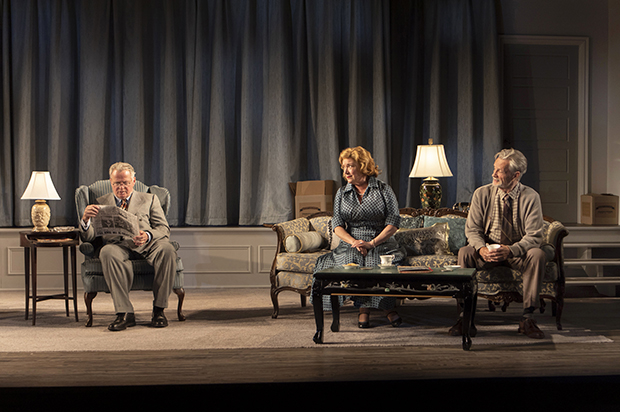
(© Monique Carboni)
"I'm still comparatively a young man," proclaims Will Kidder, the protagonist of Horton Foote's The Young Man From Atlanta. "Sixty-one ain't old." And it's true that by the standard of our leading 2020 presidential candidates, he's practically an adolescent. But when you consider his heart condition and the life expectancy for men at the time in which this play is set (1950), he probably only has a decade left.
Questions of mortality and regret hover over this sturdy revival from Signature Theatre, which has a long history of producing the late playwright's work and is the company that premiered this play in 1995. For all its flaws, it still presents a compelling portrait of the willful ignorance that is a prerequisite for the American dream.
Will (Aidan Quinn) is very much the exemplar of that dream: Like LBJ, he grew up a poor Texan. But unlike the legislator-president, his pathway to success has led him straight into the arms of the Republican Party. A big-hitter in wholesale groceries, Will is a Houstonian who values enterprise, family, and "states' rights." We can see just what kind of Southern patriarch he is in his relations with his wife, Lily Dale (Kristine Nielsen). She calls him "daddy" and he writes her large checks for Christmas.
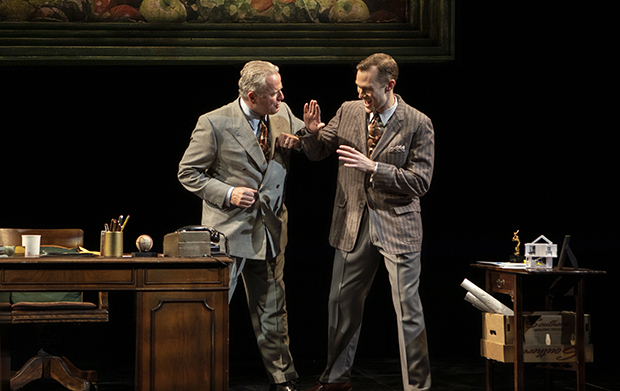
(© Monique Carboni)
But just as he is about to enjoy the fruits of his labor by moving into a lavish new home, he is fired from his job and replaced by his young protégé, Tom (Dan Bittner). He decides to start his own business, but the banks won't have anything to do with him. Complicating matters, Lily Dale has given much of her Christmas money to a strange young man who once roomed in Atlanta with their deceased son, Bill.
We learn the story of Bill's mysterious suicide in the first few minutes of the play in a long monologue that Will delivers to Tom. And although it is never spelled out, we discern the nature of Bill's relationship to the young man from Atlanta. (Have you guessed it yet?) It's awfully heavy stuff for watercooler chat, but Foote attempts to justify his lazy exposition: "I suppose I shouldn't be saying these things even to you," Will tells this surrogate son, "but I have no one else I feel I can confide in." Clun-ky.
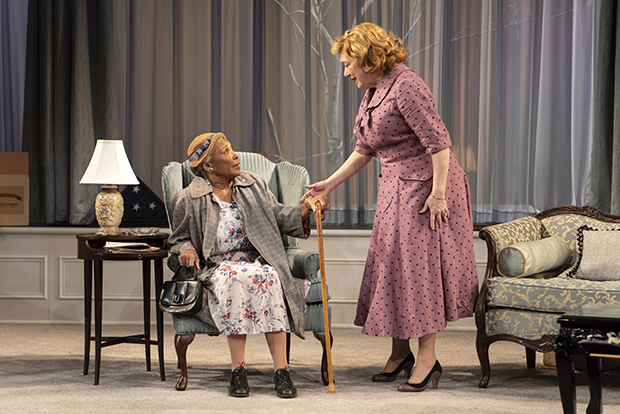
(© Monique Carboni)
The remainder of the play isn't nearly so contrived; and thanks to hearty performances from the cast, it is easy to accept these characters as people who are simultaneously grand in their emotional expressions, while ignoring the elephant in the room. Lear-like, Quinn bellows in frustration as Will's kingdom slips away. Tears come easy to Nielsen's Lily Dale, who seems to be in a state of suspended childhood.
The supporting performances are also strong: Stephen Payne delivers a gruffly sympathetic portrayal of Pete, Lily Dale's retired stepfather. Harriett D. Foy is authentically obliging as Clara, the Kidders' maid. And Pat Bowie gives a memorable performance as Etta Doris, their former maid. As she canes across the stage, she seems to carry with her the wisdom of the ages, and the disarming honesty of the very old. Her appearances are the only times that Foote's play transcends realism and approaches magic.
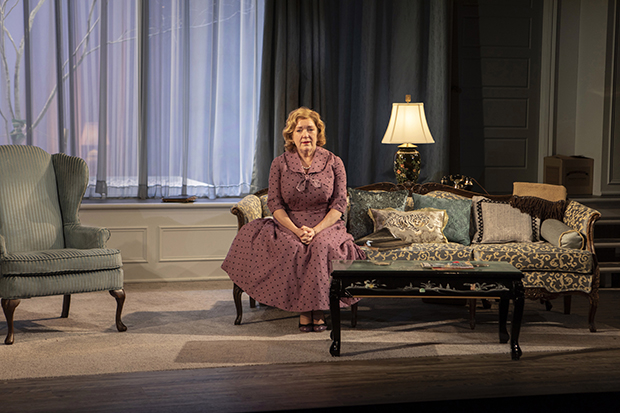
(© Monique Carboni)
Michael Wilson directs a solid production undergirded by smart design. Van Broughton Ramsey underlines the generational drama with sly period costumes: While Tom wears a handsome brown single-breasted jacket, Will wears a double-breasted holdover from the '40s.
Sound designer John Gromada emphasizes the silence of Lily Dale's life in the Kidders' dream house with the distant sound of a passing train or a chirping bird. Set designer Jeff Cowie grandly creates that home onstage, furnished in faded money green. David Lander's natural lighting streams through an upstage glass wall, through which we can see the skinniest and ugliest courtyard in all of greater Houston. It feels like a big waste, especially since it is unclear who will inherit all of this.
Lily Dale, Will, and Pete appear in Foote's sweeping Orphans' Home Cycle, and maybe seeing them eke out hardscrabble lives in the early 20th century would make me more emotional about all that they seem to be losing in this play. But divorced from that context, The Young Man From Atlanta feels like a low-stakes affair: Due to a series of poor decisions, relatively wealthy people face an uncertain retirement without their palace and servant. Chekhov wrote comedies around such scenarios, although it is telling that they are almost always performed as tragedies in America.
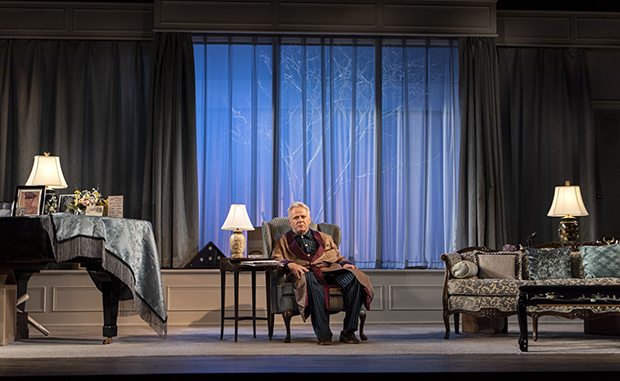
(© Monique Carboni)
But in his unassuming way, Foote exposes the blind spots in the American dream, which in its prevailing form is unrelentingly materialist and therefore unable to reckon with death. Perhaps that inability to foresee the inevitable is why we have so many septuagenarian politicians clinging to life-sustaining power. It is surely why Lily Dale, who is more perceptive than she first appears, gives away her cash to a grifter who was intimately connected with her late son. When money and prestige and power are gone, what exactly do we have left?










